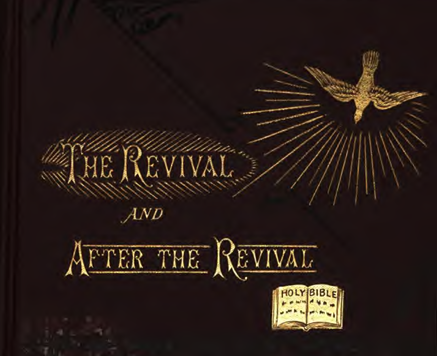This is a faithful picture of what I saw in that elegant church on the stormy evening in question. The revivalist is really not much of a “scholar.” He knows, however, that men are sinners, that Jesus Christ is the Savior from sin, that salvation is possible, and that now is the accepted time. In a word, he knows the doctrine of salvation. That is significant. He preaches salvation in the crudest, shortest, and most ungraceful way. But it is something to preach salvation. He violates all the proprieties—the proprieties of rhetoric, of elocution, of the liturgical service—but in spite of the violations of these, he still preaches salvation. He apparently knows nothing about the skepticism of the age, the speculations of the rationalists, the varying interpretations of the exegetes, or the collisions of the theologians. One would say that he had never heard of these things. At least he has wisdom enough not to exhibit any knowledge of them. But he preaches salvation. He irritates refined tastes. He destroys all the formalities, which tend toward natural reverence. For the moment, he brings the blush to the cheek of the high-toned, intellectual Methodist Episcopalian who believes in serving God decently and in order. Yet, meanwhile, he preaches salvation.
I have to admit that at first I was shocked by the methods of this passionate evangelist, and when I left the house, I almost felt sorry for the pastor, whose position and unusual relationship with his people meant that he had to put up with these misfortunes. I was glad that I was not responsible, either as pastor, presiding elder, or private member, for these crudities and irregularities. “But then,” I said, as I stumbled along in the rain, darkness, and mud, “he preaches salvation.”
But are the “seventy-eight,” or the “one hundred and fifty,” or whatever the number may be, saved? There is little thought in the sermon, no argument, and no taste. But is there salvation among the people whom he influences? This is an important question, because if it is shown that a man is doing God’s work among men, the lack of human knowledge, the lack of modern taste, the rude manners of a country boy in a stately church—these are not to be thought of. The laws of taste are constantly violated among worldly men “on a change” and in political meetings. However, if a man who is shouting himself hoarse manages to make $100,000 in two hours, the world will view the hoarseness and the yelling as justified. The laws of taste are continually violated in the sick room and the army hospital. But if the indelicate ministrations of the one save a human life and those of the other save a nation, he is a fool, as the world measures fools, who makes ado over the irregularities. Life is preferable to death, even if some aspects of it irritate overly sensitive nerves.
Strong emotions, jerky movements, and extravagances are the hallmarks of all significant changes in how people think and act. While human nature is made up of conscience, emotion, and volition, there will be a liability to excess. The more real the causes and situations seem to be, the more likely it is that someone will go too far with their expression and hurt their reputation for being calm and level-headed among people who don’t know about that reality. To a man who knows nothing about politics or parties, the extravagant joy of a political partisan over the success of his ticket—his laugh, shout, and leap—all of this appears absurd. The furor of a winning class in a college game is ridiculous to a plain old farmer who has no faith in the fun of boys and a firm conviction that “those colleges don’t do no good.” The man to whom religion is a dream, a theory, a “service,” but who never thinks of it as a regenerative, saving, and eternal force and verity, will sneer in his cold-hearted worldliness at the infatuations and follies of men who believe really and steadily in God, immortality, the Bible, and judgment.
By J. H. VINCENT
Updated 2023 Nathan Zipfel
